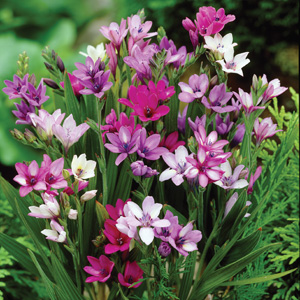Babiana Growing Guide

What is Babiana ?
Babiana (Babiana stricta) also known as the Baboon flower (because the bulbs feature in the diet of the Baboons) is a bulbous perennial which offers stunning freesia like flowers. Part of the Iridaceae family that includes irises, this bulb originates from South Africa. In Spring the dark green foliage emerges to create a neat fan like clump providing a brilliant contrast for the flowers. The flowers which are displayed on a spike are in shades of violet blue, mauve, white and magenta. They require adequate water during their growing period and then want drier conditions during Summer when they are dormant.
Benefits of Growing Babiana
Babiana are ideal for pots and containers but also excellent for naturalising in borders and rockeries. They grow best in clumps and go well between shrubs and amongst perennials at the paths edge. They are disease and pest resistant. Unlike Freesias, these lovely flowers are not fragrant so they are ideal for low allergy gardens. They make a great bulb for beginner bulb growers as they are hardy and can be neglected.
How to Grow Babiana
Climatic Zones
Suitable for all climates. Babiana can tolerate very cold conditions, although protection from heavy frost is required. They will also tolerate dry conditions.
Plant Size
Height: 15-25cm, Width: 20cm
When To Plant Babiana
Plant in Autumn
Soil Preparation
They like a rich and well drained soil so dig through well broken down compost or manure before planting.
How To Plant Babiana
Plant in full sun, 10cm apart with the bulb planted at a depth of 8-10cm. Plant with the pointy end facing up.
Babiana Plant Care
Depending on Winter to early Spring rainfall you may need to do additional watering when its close to flowering time. They can tolerate dry soil much better than over-watered soil, which can cause stress and lead to disease or rot.
The bulbs will respond to a light top dressing of all-purpose fertiliser in Winter as the growing season is about to commence.
Babiana grow well in thick clumps and should be dug up every couple of years. The bulblets, which form above the bulb, can be saved for faster multiplication. Store in a dry and well ventilated location.







